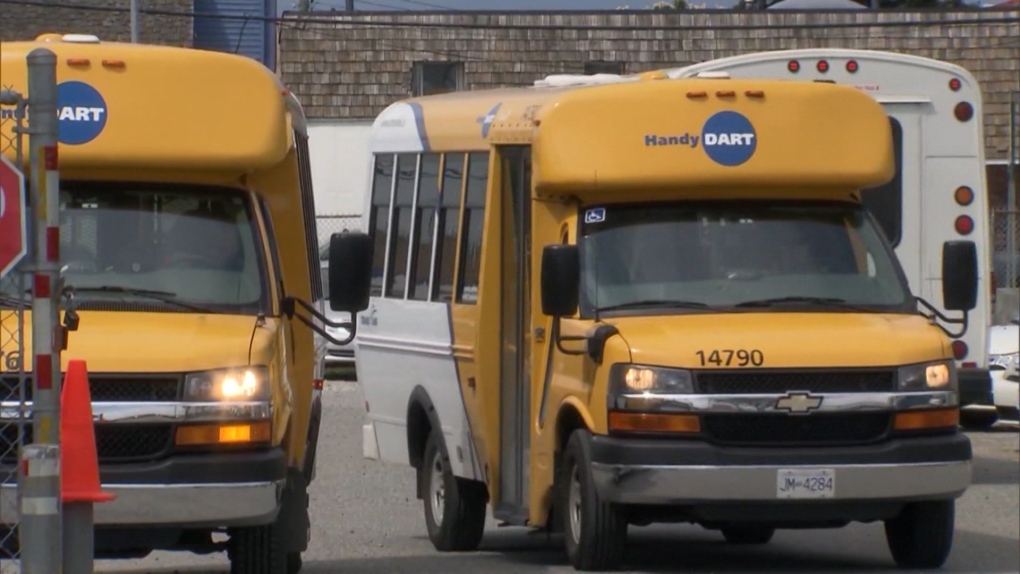A new study published this week concludes that, in 2022, TransLink’s HandyDART service provided half as many rides per senior as it did in 2008.
The report – “Access for Everyone? Publicly Operated HandyDART in Metro Vancouver” by Eric Doherty at Ecopath Planning – states that TransLink is ignoring the needs of the aging population in its strategic plan, “Transport 2050,” despite promising to work towards “Access for Everyone.”
Doherty says the root cause of TransLink’s poor service is their outsourcing of HandyDART services to private contractors, whose low wages and unsatisfactory working conditions, he says, are making it hard to recruit and retain the necessary staff.
“Even public transit agencies with better wages and conditions are having to work hard to attract and retain qualified workers,” Doherty writes in the report.
TransLink also used more taxis in HandyDART services in 2022, according to the report. It says the number of taxi trips went up by 21 per cent last year, despite TransLink’s previous commitment to reduce taxi services by seven per cent by 2021.
For its part, TransLink disputed the suggestion that its HandyDART service is poor. Spokesperson Dan Mountain told CTV News in an email that HandyDART had sufficient funding in 2022 to provide pre-pandemic levels of service, but that it received fewer requests for rides than it had in 2019.
“There were 29 per cent fewer HandyDART trip requests in 2022 compared to 2019, leading to less service delivered,” Mountain wrote.
He added that 99.6 per cent of customer-requested trips were met in 2022.
“HandyDART is a vital service and TransLink is committed to expanding HandyDART through ‘Transport 2050: 10-Year Priorities,'” Mountain wrote. “TransLink’s contractor that delivers HandyDART service, First Transit, overwhelmingly met demand in 2022 – accommodating nearly 100 per cent of customer trip requests. TransLink will continue working closely with First Transit to ensure customers receive quality service.”
Still, in a news release accompanying Doherty’s report Tuesday, various stakeholders expressed concern about the direction of TransLink’s HandyDART service. Among them was Sam Wiese, president of the BC Federation of Retired Union Members (BC FORUM), who said she heard concerns from her members.
“With all due respect to taxi drivers, very few of them are proficient in the needs of mobility-challenged individuals. While a taxi driver may do their utmost to provide assistance, their bottom line is getting one passenger out as quickly as possible to go on to the next fare” said Wiese in the release.
She says HandyDART drivers are more inclined to know their needs, and take the time to ensure trip safety, compared to taxi drivers.
“Every time a new contractor takes over, years of efficiency gains are lost as new management implements new procedures,” said Mark Beeching, president of Amalgamated Transit Union Local 1724, the union that represents HandyDART workers, in the release.
He says this affects employee morale, efficiency, quality of service and workplace health and safety.
Doherty’s report notes that the TransLink Mayors’ Council has talked about serving the region’s growing population of seniors in the past, but its Transport 2050 planning document makes no mention of HandyDART, custom transit or paratransit.
“HandyDART service, like all public transit, is not a nice-to-have. It’s a crucial, must-have piece of infrastructure that people rely upon every day,” said Stephen von Sychowkski, the president of the Vancouver and District Labour Council, in the release.
“Riders and operators alike deserve a HandyDART system that is properly funded and puts people first, as part of the public transit system, not to enrich a private for-profit company. It’s time for decision-makers to act.”
The action the report concludes decision-makers should take is “insourcing” – bringing services that were previously contracted out to private companies back under public administration.
The report “Access for Everyone? Publicly Operated HandyDART in Metro Vancouver” by Eric Doherty at Ecopath Planning is available on the Ecopath website.

